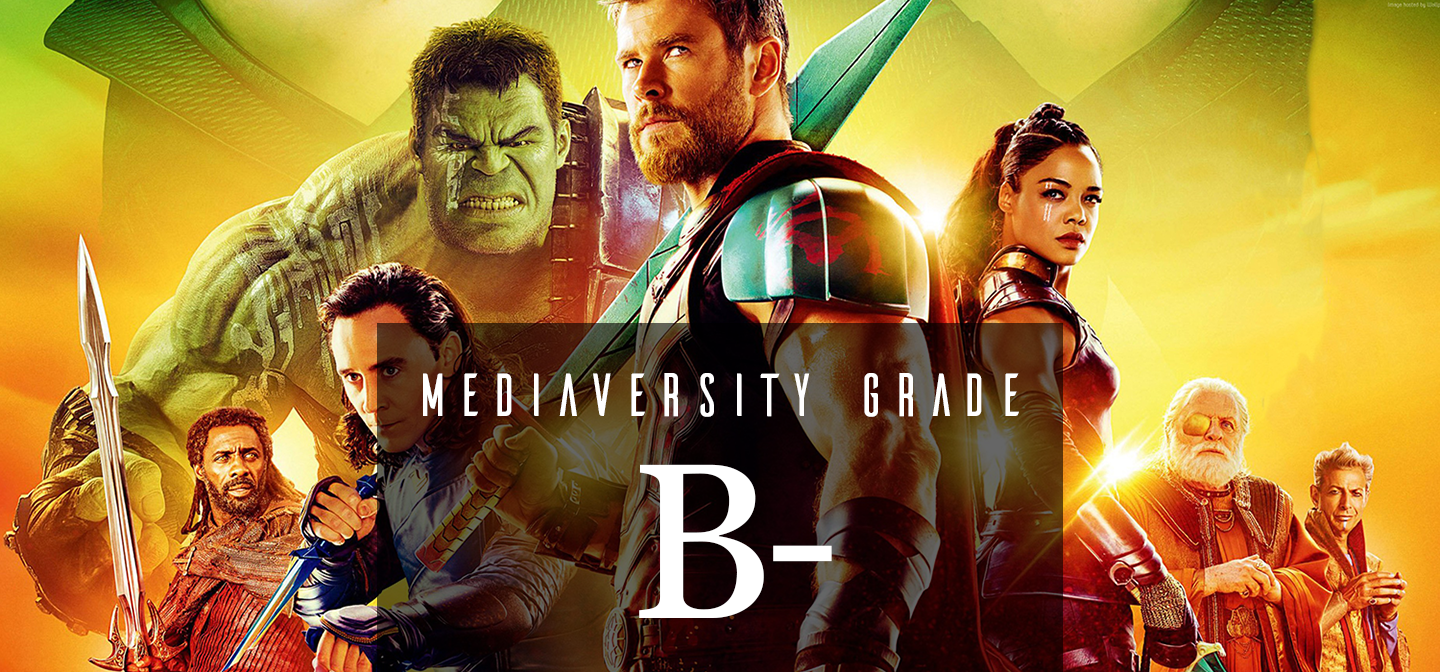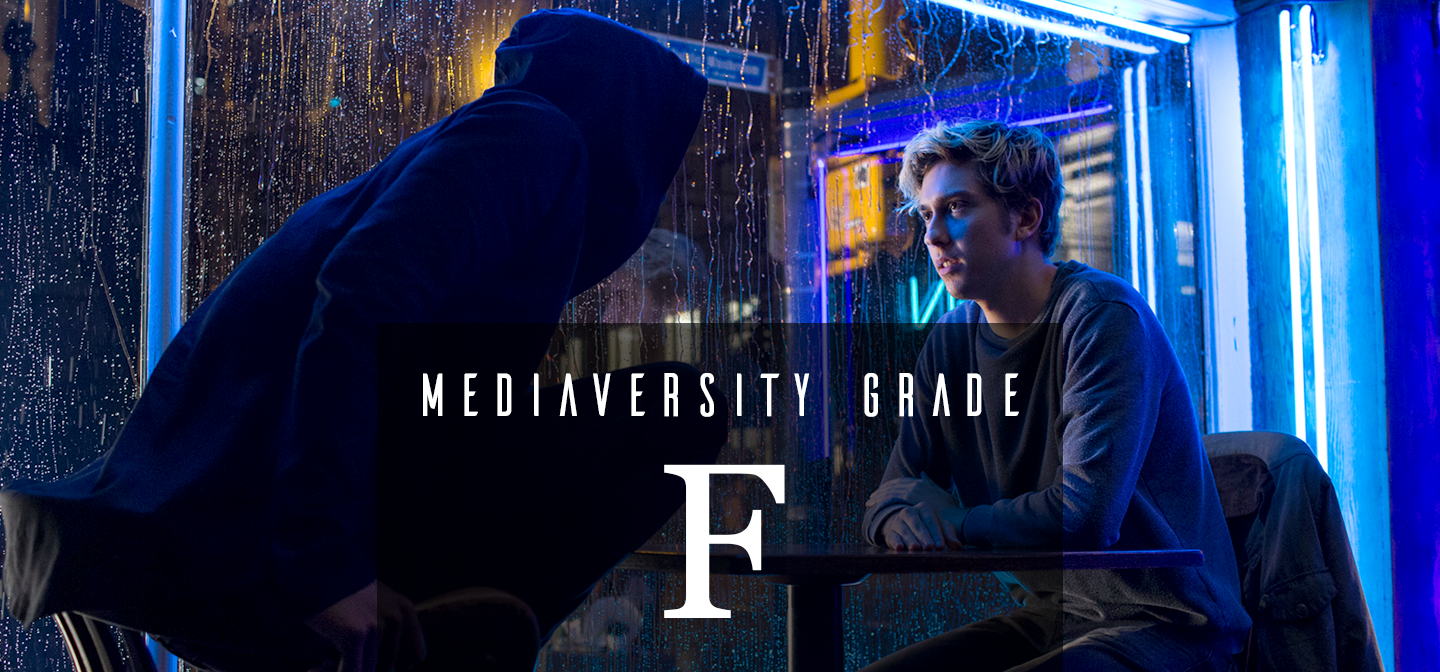Thor: Ragnarok
“Thor: Ragnarok does not pass the Bechdel test, which should be a low bar to clear in a film with two female leads.”
Title: Thor: Ragnarok (2017)
Director: Taika Waititi 👨🏽🇳🇿
Writers: Eric Pearson 👨🏼🇺🇸, Craig Kyle 👨🏼🇺🇸, and Christopher Yost 👨🏼🇺🇸
Reviewed by Ruksana 👩🏽🇺🇸🌈
Technical: 4.25/5
Thor: Ragnarok is plucked straight from the neon-drenched imagination of a kid playing superhero on the playground. Full of winning humor and unselfconscious enthusiasm for swords, lasers, fireworks and punching, it proves the promise of New Zealand director Taika Waititi’s voice and vision, first established in independent New Zealand comedies like Boy, What We Do In The Shadows, and Hunt for the Wilderpeople.
Underneath Waititi’s undeniable pizzazz remains a fairly formulaic Marvel Cinematic Universe film. Characters are shuffled breathlessly from place to place before congregating for a big fight sequence that allows the gears of this superfranchise to click forward once again. Most of these films have an interesting theme that’s only expressed somewhat peripherally, and there’s an ambitious one here: the idea of a peaceful, Western-ish civilization like Asgard engaging in revisionist history over its genocidal past, and the present-day contrast with Jeff Goldblum’s Grand Master, a violent space tyrant who is nonetheless uncomfortable using the “S-word” (slaves).
Gender: 4/5
Does it pass the Bechdel Test? NOPE
The Thor series has always had interesting female characters who are either ferocious warriors or brilliant scientists, but these women haven’t commanded much of the films’ runtimes. Thor: Ragnarok devotes plenty of the screen to badass villain Hela (Cate Blanchett) and badass anti-heroine Valkyrie (Tessa Thompson), while sparing a few choice moments for badass hench-villain Topaz (Rachel House, Maori actress and longtime Waititi collaborator).
And though Ragnarok, like most superhero films, is ultimately about boys punching things, Hela and Valkyrie are two great female warriors who shine out among a largely male ensemble cast, each with her own compelling backstory and motivation.
Other than Topaz, the Grand Master’s despotic government on the junkyard planet of Sakaar has female characters relegated to background roles or arm candy. At least in Asgard, powerful women can make their way to the front—although they are still relatively outnumbered.
Sadly, Thor: Ragnarok does not pass the Bechdel test, which should be a low bar to clear in a film with two female leads—especially because Valkyrie has a personal motivation behind wanting to fight Hela. Marvel films are surprisingly good at depicting warm, supportive and funny bonds between ostensibly straight men. It would be nice if any female characters got to have the same kind of interaction.
Race: 4/5
First of all, it’s great to see Taika Waititi, a mixed-race New Zealand director of Maori and Jewish descent, at the helm of such a massive Hollywood tentpole. It’s also encouraging to hear reports that Waititi’s Australia-based shoot made it a point to hire indigenous crewmembers.
Thor: Ragnarok is an energetic, colorful film—but still one with mostly white main characters: seven of the nine top-billed actors are white, with Idris Elba and Tessa Thompson providing black representation.
Still, it’s awesome that their characters, Heimdall and Valkyrie, are important figures in classical Norse mythology. I give major kudos to the Thor series for de-emphasizing whiteness as part of the Asgardian identity, much to the chagrin of racists.
There’s a good deal of diversity in the film’s quirky array of side characters, including the aforementioned Rachel House, and Waititi himself in two different motion-capture roles, the computer-generated fighters Korg and Miek. It’s great to see Maori actors in a film that’s smashing the weekend box office. Veteran Japanese actor and Thor alum Tadanobu Asano pops up again, but is quickly threaded out of the story.
Thor: Ragnarok’s top billing is still populated mostly by straight white men, but this is a film that seems to acknowledge that making room for people of different genders and races (and alien species!) is the right way forward.
Deduction for LGBTQ: -1.00
Film producers cut a scene that had confirmed Valkyrie as bisexual. According to Rolling Stone, Waititi fought to keep the scene, but it was ultimately removed because it “distracted from the scene’s vital exposition.” This is despite Thompson and Waititi advocating for it, and the character being bisexual in the comics as well.
Thompson has continued to be vocal about Valkyrie’s bisexuality, identifying a conspicuously-shot female character in a flashback sequence as a former lover. The film does not do anything to say this explicitly, but as a queer woman I definitely read it that way, even before reading Thompson’s take. As with Wonder Woman’s Amazons, it’s hard to imagine the Valkyries, a supernatural, all-female warrior unit, didn’t have a few queer ladies in it. Marvel missed a great opportunity. Our sexualities are valid, and our love is “vital exposition.”
Mediaversity Grade: B- 3.75/5
Thor: Ragnarok finds endless ways to have fun within the constraints of the Marvel film formula, and feels more progressive in its outlook than the 1970s and ‘80s comics and sci-fi it’s paying homage to. It’s great to have a merciless female villain and a black female heroine who are interesting characters in their own right, and it’s great to see a mixed-race director attempting to stock his film with characters of color.
There’s also a welcome sense that Ragnarok does not emerge from a solely American perspective in the way that other Marvel films do. All of these factors are enjoyable, and of course I also enjoyed the antics of Thor, the Grand Master, and my personal favorite, Loki. But at the end of the day, this is a film that feels more diverse than it actually is.




